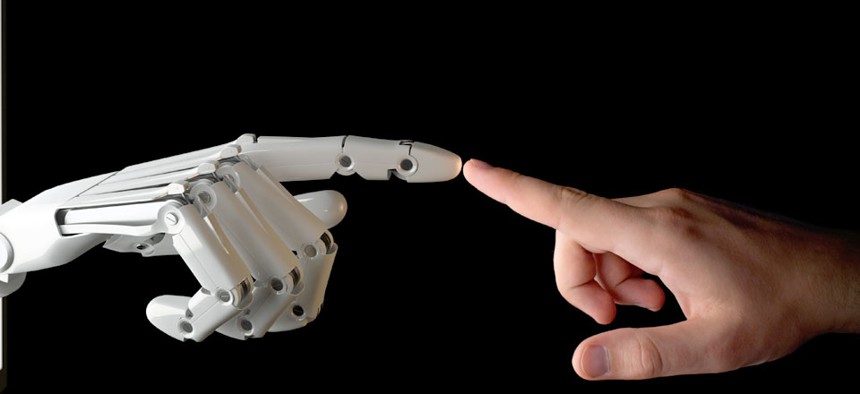Where Do We Go From Here? 8 Hypotheses About Tech in 2014

maxuser/Shutterstock.com
The year ahead will be the beginning of a new cycle in the long story of humans and the tools they use.
If there was a feeling that defined the cultural backdrop for 2013, it was technoanxiety.
The two big things were the continued rise of doing everything on a screen, and the continued rise of doing things the old way. Mobile everything. And vintage everything. Digging your hands into the earth, while software eats the world.
It wasn't so much that the technology got worse or did less or would have been less impressive to a human from 1980.
But the longer a user spends on Facebook or LinkedIn, the more cruft builds up. Many people have been through a few Apple upgrade cycles. Technical improvement is ho-hum. Connectivity is assumed. The great benefits of these technologies are no longer as striking as they were when they first appeared.
And the con list for our favorite technologies grew. The data-exhaust business models that the free web runs on turned out to have a nasty side effects. Like making perpetual surveillance by the NSA easier and almost requiring the existence of hundreds of companies trading your data.
But also: the social networks that connect us restructured our social lives in uncomfortable, coercive ways. Once we started using our phones for everything, we found we couldn't stop. The forever drone war hovers uncomfortably in our peripheral vision.
There are not the experiences of the '90s-Wired subculture, but fully mainstream phenomenon. Tens of millions have smartphones. Hundreds of millions have Facebook. The NSA is three "hops" from almost everyone.
This year, I think this uneasy balance busts. It's not that the underlying tensions will go away, but one can only remain anxious for so long. We will make our peace with our smartphones, either succumbing or overcoming, or something.
Attention will turn elsewhere. 2014 feels like the beginning of a new cycle, and that's where my focus will be. I find myself astonished at the reporting possibilities that are apparent to me this year. And I want to share some of my hypotheses with you.
Job tech. When we look back on this year from 2030, I think it will become clear that the largest change in our daily lives came around the technology—and therefore quantification and control—that we allowed to creep into our work lives. For example, right now, cameras on some buses and trucks are constantly monitoring them on the road, and when they detect some sort of anomaly, the video is sent to a human-staffed control center, where the event is recorded and coded as the driver's fault or not. That information will go into the driver's record and perhaps be used to predict when accidents might occur and perhaps be used to hire and fire drivers. Let's just say that such a system makes the roads safer, but it costs employees even more power vis a vis their employers.
The big question is: Do we want to live in this world? Do you want this kind of technology applied to your job? What kinds of artifacts will be introduced by this kind of tracking? How will the stats be juked?
As Don Peck's excellent feature on HR analytics shows, companies are pushing into this territory right now and if we want our society and politics to make the right adjustments, we need to start thinking this through now.
Robot world. After many Roombas and false starts, I'm counting on this year to be the one where robots enter the mainstream. They won't be general-purpose humanoid robots, but semi-autonomous physical objects withspecific intelligence built into them. As we start to incorporate these bots—be they drones, semi-autonomous cars, window washing bots, or nanny cameras that track movement—they'll need us to make our environments more and more legible to them. Cars need roads; robots will need similar environmental changes. Our homes will become LANs of things.
It might start with toys like Anki's smart cars or Amazon's Kiva robots, both of which use special markers on the ground to navigate a track or a warehouse, respectively, but it won't end there.
Again: Do we want to live in this kind of world, where the environments where we live are only partially designed for humans? What are the tradeoffs?
Tech strikes back. According to people in Silicon Valley, last year everyone was hating on them. And this year, they're hitting back. If you want to see the first public wave of the offensive, look no further than the renewed Twitter account of Marc Andreessen. He's got an optimistic view of the world, loves quoting stories of success, says people will adapt themselves to technology, and believes in Progress, with a capital P.
He is, in short, a stand-in for Silicon Valley, and willing to stand up for what he believes the Valley has accomplished. For those with a more pessimistic outlook, he'll be a great and fun sparring partner.
But I also think his version of taking to the airwaves is a signal of a broader movement within the Valley to say: Look, this is what we believe, and what we stand for, and love or hate us, we've done X, Y, and Z.
Will the charm and data offensive work? I don't know. But it's worth watching.
Ephemeral everything. For a time, it seemed like the Internet's major sites were all pushing in one direction: more real names, more archiving, more tracking, more accountability. My friend Robin Sloan (who used to work at Twitter) wrote a little code that would go back and delete his tweets after a set period of time, and I remember thinking how retrograde that whole idea was.
Turns out, he was ahead of the curve. The pendulum is swinging back towards pseudoanonymity and ephemerality, thanks to the success of the ephemeral apps, SnapChat and Whisper.
How far can this trend go? And once we start to assume that we have a choice between archiving and not archiving, how many will choose to turn their tweets into whispers?
The other is the idea of building decay into our social media profiles. This happens somewhat naturally thanks to linkrot and Google's preference for new stuff, but what if we got intentional about it. Why doesn't all content have a die-on date?
The non-screen. The screen is eating everything. Glass is everywhere. But there is a widespread sense among tech people that the screen must be augmented, superseded, rethought. You see this in the rush to the 2014 CES buzzword "wearables" and in Google Glass and the push to voice control by the big mobile players and Leap Motion gesture control and augmented-reality toys and in Oculus Rift, the VR helmet, and more speculatively in brain-computer interfaces. I was very excited about this trend last year, but people love their screens. It's like trying to sell Americans on buses and trains. Sure, they don't mind them, but they love their cars. (Despite the individual and societal problems that everyone can see results from driving around so much.)
So, this year, I'm taking a more exploratory approach to this topic. I want to learn more about what people love about screens from a media studies perspective. I want to investigate what screens want. And I want to see many, many more interfaces, even if they are likely to fail before the awesome power of glass.
Microbotome. You are probably aware that humans are ecosystems. We play host to billions of bacterial cells that do essential things for us, like break down food and produce certain compounds that our cells cannot. I think that our digital avatars will increasingly move towards the ecosystem model. We'll have more and more agents working on our behalf, some of them somewhat intelligent like Siri or Google Now, and others less so, like bots that do things through a service like If This Then That or sensors that monitor our homes or bodies.
Ultimately, the only way we'll manage all our various digital comings and goings and all those Internet connected things will be through these little code symbionts. And at the center of it all will be the human with a smartphone.
The shock of the mobile. Let me preview a stat that will come out more officially in our magazine next month. More than 50 percent of the traffic to Walmart.com during 2013 came from mobile devices. 50 percent! The world is going mobile at an astonishing pace for everyday Internet usage, and not just in the upper income brackets.
I will contend that we still have no idea what this means. The most basic access method of the Internet is being reconfigured before our very eyes, and that's bound to have enormous consequences. Yet, by and large, it sure seems like not all that much has changed. I predict 2014 is when we start to feel the unexpected reverberations that come with this sea-change in human behavior.
One thing I'm not expecting: tablets to be driving all this. Phones are where the action is.
Kids and technology. Here in the Bay, letting your child look at a screen seems like a cause of great shame. Even if that screen is showing a book! Given that this is also the seat of technology, this is a curious class and culture phenomenon.
Watching my son look at a screen, though, you can see why people get freaked out. It's like there is a consciousness vortex in there and it is sucking his brain into the device. Without any judgment applied, the behavior itself is remarkable. He doesn't know what an app is, but a screen full of app icons can hold his attention for minutes and minutes.
After reading Natasha Schüll's book on feedback loops in Vegas gambling machines, what I've resolved is that the problem isn't the screen, per se, but the way that even basic gestures on a screen can start to exert a compulsive pull. Doing the gestures to get the reward becomes the point, rather than the reward itself.
This line of reasoning suggests more interesting ways of putting technology in its proper place than just limiting screen time.
It would say: Books on screen are fine, but games are out. It would say watching a cartoon on a screen is fine, but clicking through YouTube every couple minutes would be out. Most generally, screen activities that require parental involvement or feedback are superior to activities that do so automatically.
But this is still something I'm working out, and I'll be reporting out what I find.
Feel free to get in touch with your own ideas about what we should be paying attention to in 2014. There's a lot going on.
(Image via maxuser/Shutterstock.com)






